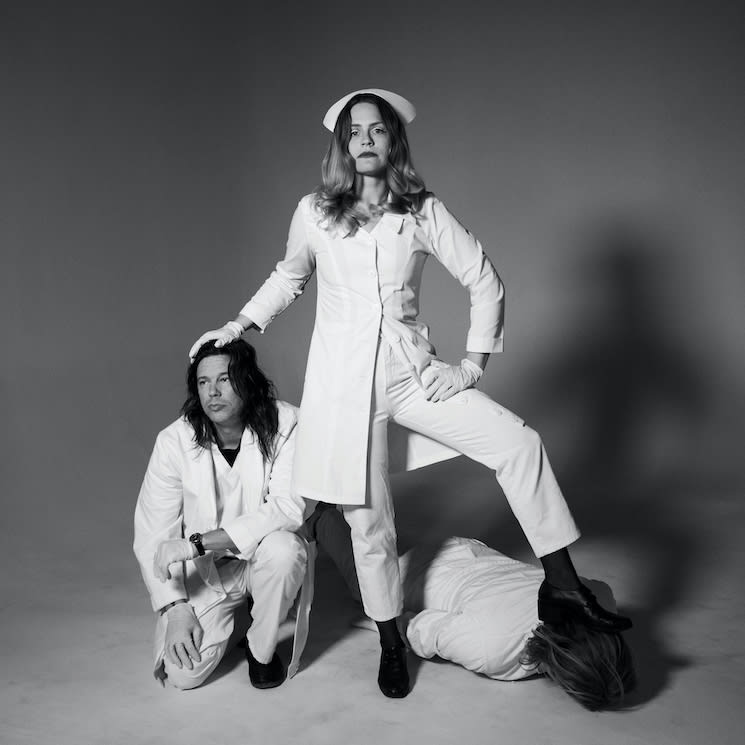If there were ever a record whose title lines up perfectly with the sonics found within, it's Surgery Channel. The sophomore record from Denee Segall, Ty Segall and Emmett Kelly's wild, rebellious C.I.A project, Surgery Channel buzzes with fuzz-blasted dual bass and synths that pierce like surgical implements.
The mix of drum machine and live drums ties together the synthesized sounds to the grimy, earthy tones, while Emmett Kelly adds to the cacophony, playing synth and one of two (!) basses alongside Ty himself. Denee's vocals borrow some of Karen O's reserved cool but none of her open-hearted wildness, rolling over these tense arrangements with a tempered chill.
The effect is akin to being on some sort of Frankenstein analog-digital operating table while robotic surgeons do their bloody work. Unfortunately, the operation doesn't seem to be going well — sonically, everything eventually devolves into chaos. One moment they're whispering to each other and the next they're shrieking "SURGERY CHANNEL!" as things spiral viscerally out of control.
After last year's considerably domestic and chilled out Hello, Hi, Ty and Denee are back to the overdriven madhouse fuzz sound that once defined Ty's career. Without guitars, these textures evolve into something more industrial than garage — the sonic difference between an assembly line and a tool bench. Rhythms repeat endlessly, and things seem to be falling apart at the seams.
On more cohesive tracks, like the excellent single "Impersonator," the anxious vocals mesh with the controlled bass chaos, and create the filthiest pump-up song Ty's played on in a while. By contrast, the meandering, confusing and aggressive centerpieces "Surgery Channel" and "Surgery Channel II" never seem to become much more than a series of fuzzy, barely cohesive sections. Thankfully, there are more personal stories told, like the paranoid, anti-domesticity tale that Denee spins on "Bubble."
While the sonic textures remain in their typical buzzed out territory, the tracks where tempos ramp to harrowing speeds don't entirely work. Confusion, rather than the intended anxiety, is what's left on frenetic tracks like "You Can Be Here" and "The Wait". The C.I.A. are often at their best at mid tempo, synthetic garage rock anthems like "Inhale Exhale" and "Better" than they are at going full revved-up robo punk. Denee Segall has an incredible handle on her subtly shifting vocal tones, and it's an exciting prospect to hear how a more focused follow-up by the trio would sound now that she's proven she can inhabit so many characters on this blurry record.
(In The Red)The mix of drum machine and live drums ties together the synthesized sounds to the grimy, earthy tones, while Emmett Kelly adds to the cacophony, playing synth and one of two (!) basses alongside Ty himself. Denee's vocals borrow some of Karen O's reserved cool but none of her open-hearted wildness, rolling over these tense arrangements with a tempered chill.
The effect is akin to being on some sort of Frankenstein analog-digital operating table while robotic surgeons do their bloody work. Unfortunately, the operation doesn't seem to be going well — sonically, everything eventually devolves into chaos. One moment they're whispering to each other and the next they're shrieking "SURGERY CHANNEL!" as things spiral viscerally out of control.
After last year's considerably domestic and chilled out Hello, Hi, Ty and Denee are back to the overdriven madhouse fuzz sound that once defined Ty's career. Without guitars, these textures evolve into something more industrial than garage — the sonic difference between an assembly line and a tool bench. Rhythms repeat endlessly, and things seem to be falling apart at the seams.
On more cohesive tracks, like the excellent single "Impersonator," the anxious vocals mesh with the controlled bass chaos, and create the filthiest pump-up song Ty's played on in a while. By contrast, the meandering, confusing and aggressive centerpieces "Surgery Channel" and "Surgery Channel II" never seem to become much more than a series of fuzzy, barely cohesive sections. Thankfully, there are more personal stories told, like the paranoid, anti-domesticity tale that Denee spins on "Bubble."
While the sonic textures remain in their typical buzzed out territory, the tracks where tempos ramp to harrowing speeds don't entirely work. Confusion, rather than the intended anxiety, is what's left on frenetic tracks like "You Can Be Here" and "The Wait". The C.I.A. are often at their best at mid tempo, synthetic garage rock anthems like "Inhale Exhale" and "Better" than they are at going full revved-up robo punk. Denee Segall has an incredible handle on her subtly shifting vocal tones, and it's an exciting prospect to hear how a more focused follow-up by the trio would sound now that she's proven she can inhabit so many characters on this blurry record.
